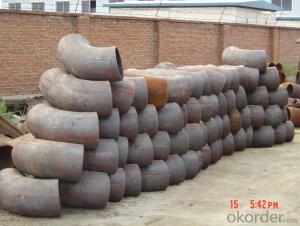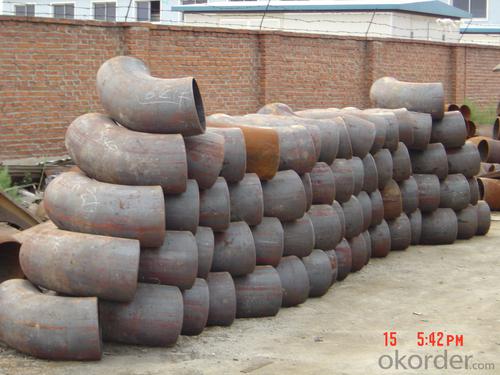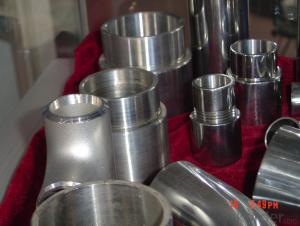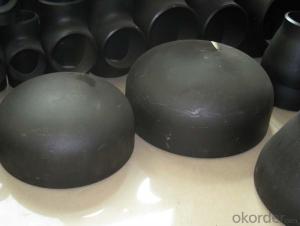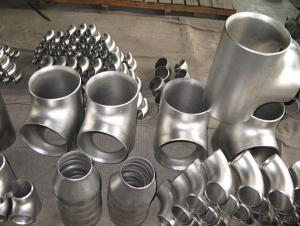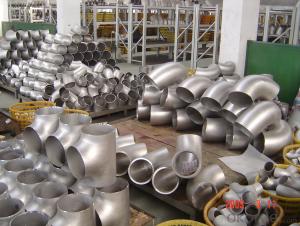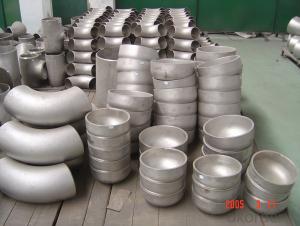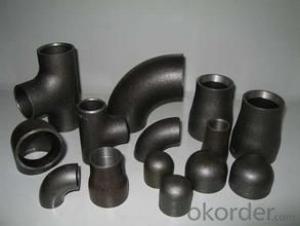CARBON STEEL PIPE BUTT WELDED FITTING A234 WPB B16.9
- Loading Port:
- Tianjin
- Payment Terms:
- TT OR LC
- Min Order Qty:
- 1 pc
- Supply Capability:
- 10000 pc/month
OKorder Service Pledge
OKorder Financial Service
You Might Also Like
Package Of Carbon Steel Butt-Welded Fitting:
PACKED IN PLYWOOD CASES OR PALLETS
Painting Of Carbon Steel Butt-Welded Fitting:
BLACK PAINTING FOR CARBON STEEL
Marking Of Carbon Steel Butt-Welded Fitting:
REFER TO MARKING DOCUMENT or AS PER CUSTOMER REQUEST
Shipping Marks Of Carbon Steel Butt-Welded Fitting:
EACH WOODEN BOX TWO PLASTIC SHIPPING MARKS
Specification Of Carbon Steel Butt-Welded Fitting:
Carbon Steel A234 WPB 90Deg LR Elbow, Tee, Reducer and Cap
Size : 1/2"-48"
Wall Thickness.: SCH10-SCH160, SGP , XS, XXS, DIN ,STD
| Name | ASTM A234 WPB carbon steel ELBOW , tee , reucer, and cap |
| Size | 1/2" - 48" |
| Angle | 45D 90 D 180D |
| Wall thickness | Sch5-Sch160 XXS,STD,XS, SGP |
| Standard | ASME B16.9, GOST 17375-2001, DIN2605 and JIS B2311, EN10253-1 etc. |
| We can also produce according to drawing and standards provided by customers. | |
| Material | Carbon steel pipe fittings , alloy steel and stainless steel. |
| Packaging | Wooden Cases, wooden pallet , or carton box , or nylog bag and then in wooden cases |
| Surface Treatment | Paintting black color , and Shot blasted,anti-rust oil , |
| Delivery Time | 20-30 days, after received advance payment. |
| Quality | First grade |
| Others | 1.Special design available according to your drawing. |
| 2.anti-corrosion and high-temperature resistant with black painting | |
| 3. All the production process are made under the ISO9001:2000 strictly. | |
| 4. A conformity rate of ex-factory inspection of products. | |
| 5. we have export right , offering FOB , CNF CIF price |
STANDARD & MATERIAL GRADE
STANDARD Of Carbon Steel Butt-Welded Fitting
| Standard | Wall Thickness | Type | |
| American Standard | ASME B16.9 | S5S ~ XXS | 45D, 90D, 180D ELBOW, TEE, REDUCER, CAP, STUB END |
| ASME B16.11 | |||
| ASME B16.28 | 90D SR ELBOW | ||
| Japanese Standard | JIS B2311 | SGP ~ LG |
MATERIAL Of Carbon Steel Butt-Welded Fitting
| Carbon Steel聽 | ||
| Material Standard | Material Grade | |
| ASTM | ASTM A234 | WPB |
- Q: What is the outer diameter and wall thickness of the welded steel pipe of national standard DN250?
- DN (nominal diameter) 250 is generally the industry said 273, welded steel pipe (spiral steel pipe) thickness is generally between 6-8mm, more common.
- Q: Are steel pipes suitable for potable water supply?
- Yes, steel pipes are suitable for potable water supply. They are commonly used for water distribution systems due to their durability, strength, and resistance to corrosion. However, it is important to ensure that the steel pipes are properly coated or lined to prevent any potential contamination of the water supply.
- Q: What are the different types of steel pipe supports for high-temperature applications?
- Some different types of steel pipe supports for high-temperature applications include hangers, clamps, brackets, and anchors. These supports are designed to withstand the elevated temperatures and provide stability and proper alignment to the piping system.
- Q: What are the potential health hazards associated with steel pipe installation?
- Some potential health hazards associated with steel pipe installation include exposure to hazardous chemicals used in the coating or treatment of the pipes, inhalation of dust or fumes generated during cutting or welding, and physical injuries due to accidents or mishandling of heavy equipment. Additionally, improper handling or disposal of waste materials and contaminated water can pose environmental health risks. It is important to follow proper safety protocols, use personal protective equipment, and ensure proper ventilation and waste management to mitigate these hazards.
- Q: How do steel pipes differ from other types of pipes?
- Steel pipes possess several distinct characteristics that set them apart from other pipe types. Primarily, their strength and durability are well-known. They exhibit remarkable resistance to heat, pressure, and corrosion, rendering them suitable for numerous applications. Additionally, their robustness allows them to bear heavy loads and offer an extended service life. One distinguishing feature of steel pipes lies in their versatility. They can be manufactured in various shapes and sizes to fulfill specific project requirements. This adaptability has contributed to their popularity across a diverse range of industries, including construction, oil and gas, water treatment, and manufacturing. Moreover, steel pipes exhibit exceptional thermal conductivity, facilitating efficient heat transfer between different areas. Consequently, they prove suitable for applications involving heating and cooling systems, as well as the transportation of hot fluids or gases. Furthermore, steel pipes are renowned for their resistance to fire. They possess a high melting point and are not easily ignited or conducive to the spread of flames. This characteristic is particularly critical in applications where fire safety is a concern, such as buildings or industrial facilities. Lastly, although steel pipes may entail a higher initial cost compared to other pipe types, their long-term benefits, such as durability and low maintenance requirements, often outweigh the initial investment. Additionally, steel pipes are highly recyclable, making them an environmentally friendly choice. In summary, steel pipes stand out due to their strength, durability, versatility, excellent thermal conductivity, fire resistance, and recyclability. These remarkable qualities establish steel pipes as the preferred option for a wide range of applications across various industries.
- Q: Can steel pipes be used for gas transmission pipelines?
- Yes, steel pipes can be used for gas transmission pipelines. Steel is a commonly used material for gas pipelines due to its strength, durability, and resistance to corrosion. Additionally, steel pipes can withstand high pressure and temperature conditions, making them suitable for transporting natural gas over long distances.
- Q: How are steel pipes used in the mining industry?
- Steel pipes are commonly used in the mining industry for various purposes such as transporting water, slurry, and other materials, as well as for ventilation and support systems in underground mines.
- Q: Are steel pipes suitable for industrial applications?
- Steel pipes are an excellent choice for industrial applications. They come with several advantages that make them the preferred option in various industries. Firstly, their strength and durability are exceptional, enabling them to withstand high pressure and heavy loads. This makes them perfect for transporting liquids, gases, and solids. Furthermore, steel pipes exhibit high resistance to corrosion, a critical feature in industrial settings where exposure to harsh chemicals, moisture, and extreme temperatures is common. Their corrosion-resistant properties ensure a longer lifespan and reduce the need for frequent maintenance and replacements. Additionally, steel pipes have a smooth interior surface, minimizing friction and allowing for efficient material flow. This is particularly vital in industries like oil and gas, where the smooth flow of fluids is essential for proper operations. Moreover, steel pipes offer a wide range of sizes and thicknesses, allowing for customization and flexibility in design. They can be easily welded and connected, facilitating simple installation and modification as per specific industrial requirements. Overall, steel pipes provide a combination of strength, durability, corrosion resistance, and versatility, making them highly suitable and widely used in various industrial applications such as oil and gas, construction, water treatment, power generation, and chemical processing.
- Q: How do you calculate the weight of a steel pipe?
- In order to determine the weight of a steel pipe, one must possess knowledge of the pipe's dimensions, specifically the outer diameter (OD), wall thickness, and length. Initially, one must ascertain the cross-sectional area of the pipe. This can be accomplished by subtracting the inner diameter (ID) from the outer diameter (OD) and dividing the outcome by 2 to acquire the radius. Subsequently, the formula A = πr^2 can be employed to compute the area. Following this, it is necessary to multiply the cross-sectional area by the length of the pipe to obtain the volume. The formula for volume is V = A * L, where A denotes the cross-sectional area and L signifies the length. Lastly, to determine the weight of the steel pipe, one must multiply the volume by the density of steel. The density of steel generally falls around 7850 kilograms per cubic meter (kg/m^3) or 0.2836 pounds per cubic inch (lb/in^3). The formula for weight is W = V * ρ, where V represents the volume and ρ denotes the density of steel. It is crucial to note that if one is employing different units, a conversion is imperative to match the units of the density. For instance, if the length is in feet and the density is in pounds per cubic inch, the length must be converted to inches prior to conducting the calculations. Always remember to thoroughly verify your measurements and calculations to ensure precision.
Send your message to us
CARBON STEEL PIPE BUTT WELDED FITTING A234 WPB B16.9
- Loading Port:
- Tianjin
- Payment Terms:
- TT OR LC
- Min Order Qty:
- 1 pc
- Supply Capability:
- 10000 pc/month
OKorder Service Pledge
OKorder Financial Service
Similar products
Hot products
Hot Searches
Related keywords
